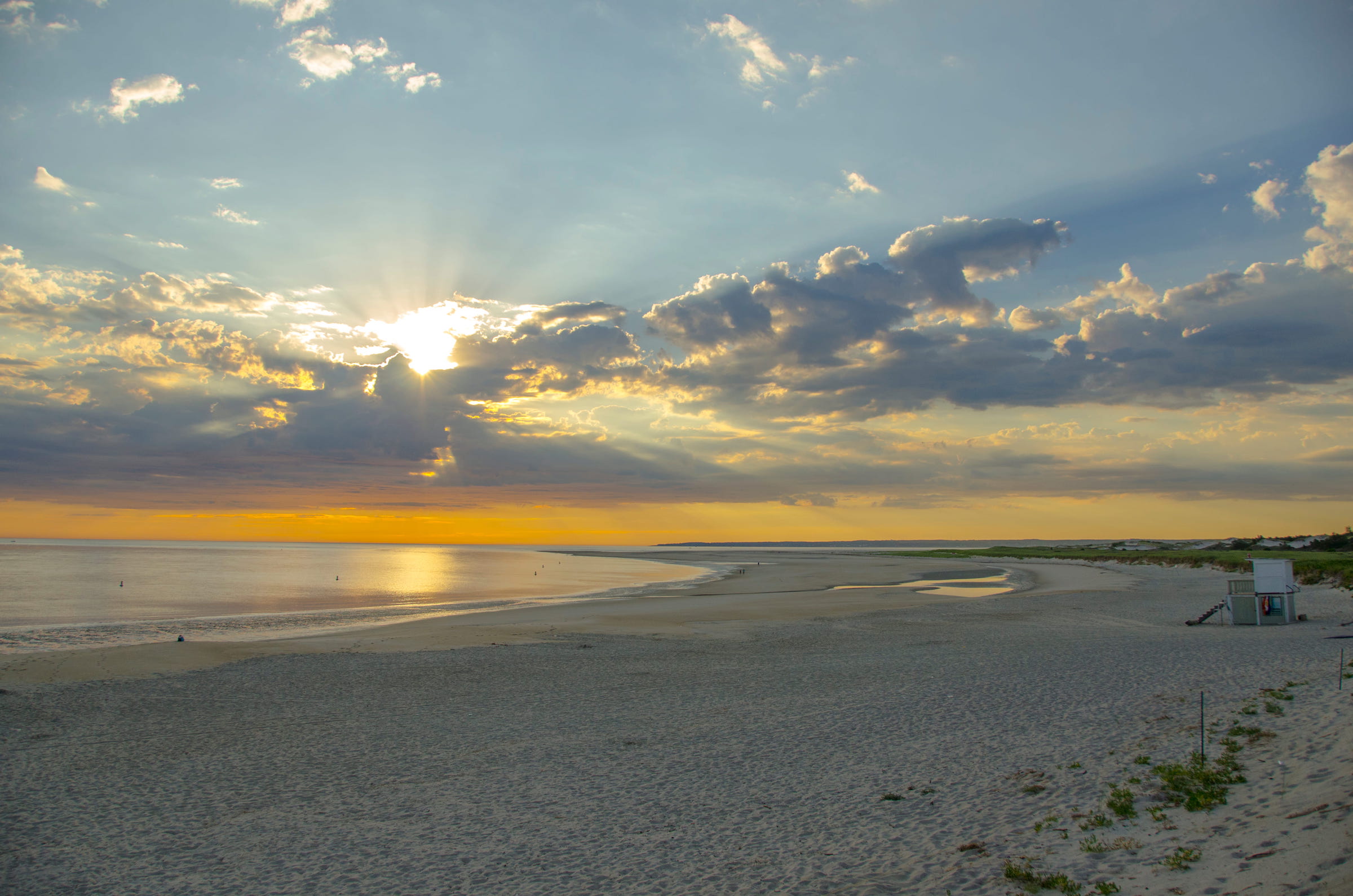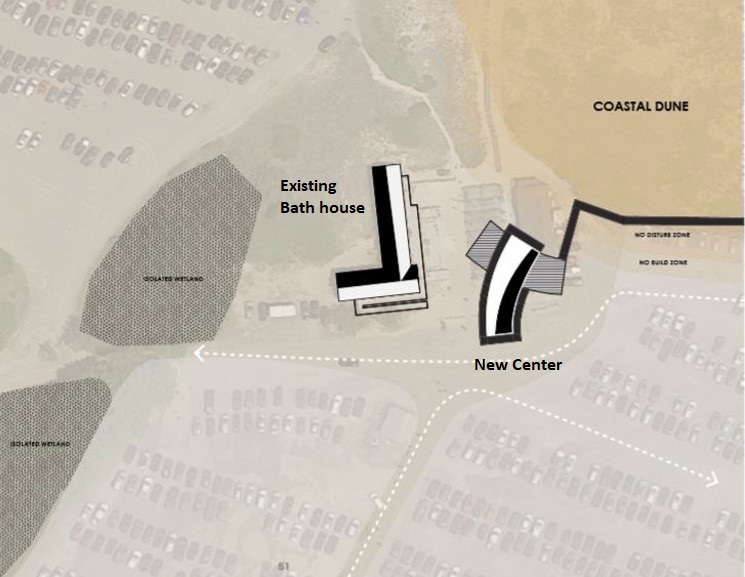BACKGROUND
As a major part of our commitment to respond to a changing coast, The Trustees is planning a new Coastal Education Center at the Crane Estate in Ipswich. Situated between this stunning Atlantic barrier beach and the estuaries of the Great Marsh, the Center is a natural stepping off point for field-based and other experiences that will foster and promote the environmental and climate literacy of our Members, the local community, and the public. The Center will be a regional hub for coastal exploration and education and serve as a model for sustainable design, and we will use our coastal landscapes to inspire visitors to explore, learn, and develop a love of the coast. The educational experience will be highly sensory-driven and tactile as visitors are immersed into the dynamic landscapes (beaches, saltmarshes, dunes) of our coast.
This page will serve as a place to get more information about the proposed building and to follow along with updates as the process moves forward.
FAQs
Q: Where will the new Center be located?
A: The new Center will be located at Crane Beach on the Crane Estate. It will sit roughly on the same footprint as the existing refreshment stand, but shifted slightly southwards away from the dune to allow for natural process to occur unabated (see photo below). The existing structure will be removed to accommodate the resilient, new building. Full consideration and care with regard to the site’s proximity to sensitive, protected dune habitat is being made, as well as attention to detailed site studies of current and future flood models.
Q: What will be in the building? Will there still be a snack shack and retail store?
A: Yes! These staples of the summer will be a part of the new, two-story building. In addition, the upstairs coastal education center will serve as a dynamic space with interactive exhibits and modular spaces that can flexibly serve multiple purposes. For example, the space will be used for drop-in experiences and general visitation in the peak of summer, as classroom space in autumn and spring, as a volunteer meeting spot on weekends and evenings, to host collegial meetings and trainings during offseason weekdays, and more.
Q: What will the building look like?
A: A final design has not been developed. However, the new structure will move slightly south away from the dune. Sustainability and resilience will be key elements of the design. We aim for the building to blend well with landscape features and the existing bathhouse structure.
Q: What input will the public have in the Center?
A: The Trustees will host multiple information sessions that will be open to the public and we will be forming a community task force to provide input on the education programming and local partnerships. Also, this project will require going through the municipal permitting process via boards from the Town of Ipswich, and residents will have an opportunity to participate in that public process.
Q: What kind of programming will be offered in the Center?
A: The Center will provide a range of engagement and educational experiences for the community, including:
- Drop-in visitation hours (included for free with Crane Beach admission)
- Learn about the Crane coast, vulnerability and resilience, Trustees’ coastal work on the North Shore & beyond, Great Marsh, & more
- Interactive exhibits, maps, touch tanks
- Innovative resources that are both high-tech (e.g., data visualization, virtual reality, modeling) and low-tech (e.g., sand table, basic measuring/field tools)
- Youth programs
- Field trips with schools/youth and their educators
- Partnership with Ipswich Public Schools will be explored
- Partnerships with other districts/schools will be welcomed
- SummerQuest, our coastal education summer camp, will have new resources with which to engage the next generation
- Scouts and other youth group opportunities
- Recreational experiences
- Guided paddles, hikes, and more
- Wellness & fitness (e.g., yoga, mindfulness, affinity hiking groups, challenges)
- Specialty natural history (e.g., Coastal Shorebirds, Astronomy, Geology)
- Volunteer opportunities
- Citizen monitors and coastal volunteers
- including school/youth engaged in field study
- Includes volunteers for our beach clean-ups and monitoring efforts
- Public, including corporate and other groups
- Colleague and leadership opportunities
- Volunteer training programs
- Internships and for budding coastal workers (educators, ecologists, stewards, business/recreational enterprise, etc.)
- Meeting/training hub for coastal resource managers, educators, scientists, etc.
Q: Will people have to pay extra to access the Center?
A: No, the cost of visiting the Center will be included with Crane Beach admission.
Q: Who is paying for this and how much does it cost?
A: The Center is being constructed with a very generous $1.5 million anonymous donation, for which The Trustees is incredibly grateful.
Q: When will construction start and when will the Center be open?
A: If all goes to plan, we hope that the Center will be operational by May of 2022. The design and permitting process will commence in late 2020 and the demolition of existing building is slated to begin in early September of 2021, with the Center operating year-round.
Q: Will the opening of the Center increase summer traffic?
A: During the summer months, we will focus on existing beach visitors serving as a drop-in resource. We will focus the new educational programming and partnerships during off-season in spring, fall, and winter, to ensure that we are effectively managing traffic.
Q: Why is The Trustees so invested in coastal education?
A: The solutions required to address coastal change are multi-faceted and will require more than just landowners to address. In many cases, partnerships will be needed to tackle complex and often costly projects. Bold policy and decision-making will require the engagement and input of an informed public, which Coastal education will help to build and support. We hope that many of the 350,000+ annual visitors to the Crane Estate will be touched in some way through our expanded efforts. The Center will offer opportunities for engagement at many levels, helping us to address many facets of our strategic plan in one place. Whether visitor engagement is a one-time visit to the Center while en route to a day at the beach or the deep, decades-long commitment of a middle school teacher returning with students for their annual erosion, geology, and coastal engineering study, the goal is to educate and inform at all levels and touch points.

